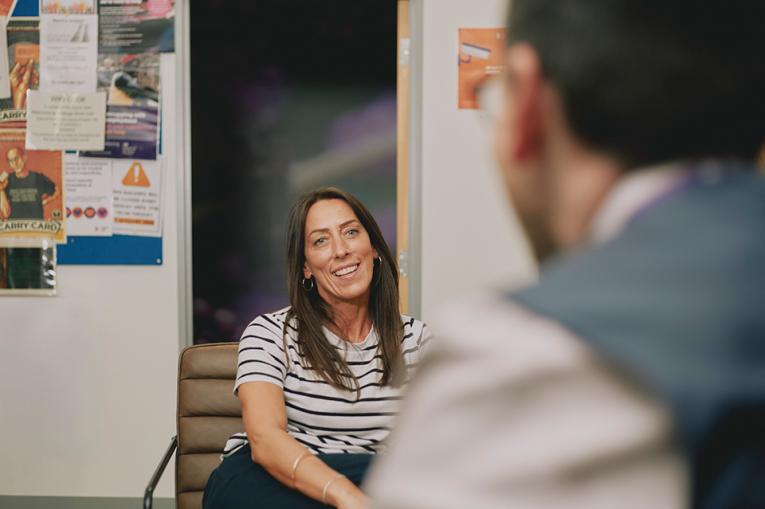Understanding ketamine use: Recognising the signs and offering support
This page explains some of the possible signs of ketamine use and how it can affect physical and emotional wellbeing.
Possible signs of ketamine use
People use ketamine for different reasons, and in different ways. Some use it occasionally, in social settings, while others rely on it more often. The effects can vary, and not everyone experiences all the signs described below.
Whatever the situation, support is available for both you and your loved one. You don’t need all the answers. Just know that help is available and even small steps can make a big difference.
Ketamine affects people in different ways, but there are some common signs of use. These don’t always mean ketamine is involved, but if you notice a few of them, it may be worth gently checking in.
What does it look like when someone is using ketamine?
More serious side effects from longer-term use
Impacts on daily life
Ketamine use can affect how someone manages day-to-day life. Someone might:
- Avoid leaving the house due to pain, toilet issues or anxiety
- Neglect personal hygiene or appearance
- Struggle to keep routines like school, work, or meals
- Isolate or confine themselves to their bedroom
- Avoid friends or social events they used to enjoy
Remember: Everyone is different. Not everyone shows the same signs. What matters most is spotting changes, staying connected, and offering support without judgement.
Impacts on you and your family
When someone you care about is using ketamine, it can affect the whole family. You might feel overwhelmed, worried, or unsure of how to help. It’s normal to experience a range of emotions while trying to support a loved one.
You may also notice:
- Emotional stress: Constant worry, fear, or sadness
- Sleep problems: Late-night stress or disturbances
- Guilt or self-blame: Questioning if you could have prevented it
- Financial pressure: Dealing with missing money or related costs
- Social isolation: Withdrawing from others due to shame or fear of judgement.
- Neglecting your own wellbeing: Putting your health and needs last
What is a K-hole?
A K-hole can happen after taking a high dose of ketamine. It is an intense state where a person feel disconnected from their mind, body and surroundings.
Some people describe it as floating, falling or being stuck inside their own head. Some find it calm or dream-like, while others find it overwhelming or scary. From the outside, they may seem unresponsive and confused. It can be alarming – almost like they’re asleep with their eyes open or lost in their own world.
What you might see
- They may not respond when you speak to them.
- Their body may seem floppy or frozen.
- They might be breathing slowly but steadily.
- They may appear to be hallucinating or mumbling.
- Time and surroundings may feel completely unreal to them.
What you should do
- Stay calm: It usually passes in 30-60 minutes
- Keep them safe: Move them away from danger (e.g. stairs, roads)
- Stay with them: Do not leave them alone
- Don’t try to shake or wake them forcefully: This may cause panic or confusion
- Check their breathing: Call 999 if they stop breathing or you’re unsure
- Offer reassurance: They may feel confused or scared when coming round
What to do when someone comes out of a K-hole
Many people feel disoriented, scared, or low. Try to stay calm, be present, and avoid judgment. You can say something like: “That looked scary. I’m here for you – do you want to talk about it?”
Use it as a chance to gently open a conversation about their substance use, health and possible support options.

Getting support for yourself
You don’t have to go through this alone. Talking to a professional, joining a family support group or speaking with a trusted friend can make a big difference.
Many areas offer one-to-one support or peer-led family groups for those affected by a loved one’s ketamine use. Connecting with others who share similar experiences can reduce feelings of isolation and guilt, and provide greater understanding.
You don’t have to wait for your loved one to be ready. Contact your local drug service to learn about ketamine support, get answers, and explore gentle ways to involve your loved one when ready.
What to do if you suspect ketamine use
If you are worried your loved one might be using ketamine, talking to them in the right way can make a big difference.
Start with a calm conversation: We’ve shared plenty of tips on talking to a young person about drug use.
Be patient, stay present: Watching a loved one struggle is hard, but pushing too hard can backfire. Change doesn’t happen overnight. Just staying connected is a powerful form of support.
Know that help is available: When ready, support services can help the young person understand their ketamine use, mental health and future goals. As a parent or carer, it’s okay to seek advice even if they’re not ready for help yet. Talking can help you feel less alone.
Educate yourself: Learn more about ketamine use and its effects on our ketamine advice page.
Show compassion: It can be difficult but try to avoid blame or shame. Remember that substance use is often a response to underlying challenges.
Focus on the person, not the problem: Reinforce their ability to overcome this.
Getting professional help
You’re not alone. Support services can help your child and for your whole family.
Drug and alcohol services
Specialist services for young people and families are there to help, not judge. They can:
- Talk to the young person about their ketamine use in a safe, confidential space.
- Offer one-to-one support, counselling, and health checks.
- Help your loved one understand the risks and build healthier coping strategies.
- Support you as a parent/carer, giving you advice and space to talk, too.
- Getting support early helps prevent long-term harm and offers your loved one the best chance to change. If they’re not ready to stop, services can promote safer use.
Remember: Many people struggle to engage with support services. This can be due to nerves, uncertainty or fear of judgement, making asking for help seem overwhelming.
To find out what support is available near you, get in touch with your local drug and alcohol service. Your GP or local health service should also be able to advise you.
Medical support
If your loved one is willing, encourage a visit to a GP or health professional. They can:
- Check for bladder, kidney, or mental health problems
- Rule out other causes, especially for pain or memory issues
- Start a record of their health in case they need help later
- Many drug and alcohol services have nurses or doctors on site or work with local health teams, so they can support with this, too.
Online and telephone support
-
FRANK
FRANK provides information about drugs, advice for people using drugs, and support for families, including a confidential helpline and local treatment guidance.
-
Adfam
Support and information for families, including local support groups and resources to help families cope with the challenges of a loved one's substance use.
-
Addiction Family Support
Provides support to families through online one-to-one and group meetings, and a confidential helpline.
-
NSPCC
Advice and support for parents concerned about their child's substance use, as well as resources to help keep children safe

